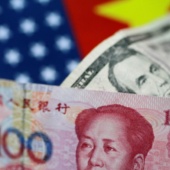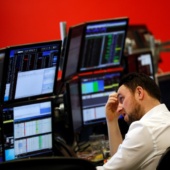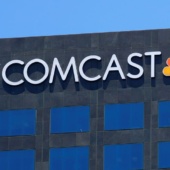Donald Trump vowed on his campaign that he would tax all goods imported into the US if he won back the White House. Following his victory, businesses and economists around the world are scrambling to work out how serious he is.
Trump sees tariffs as a way of growing the US economy, protecting jobs and raising tax revenue.
In the past, he has targeted tariffs at individual countries such as China or certain industries, for example steel.
But Trump’s election campaign pledge to impose taxes of 10% to 20% on all foreign goods could affect prices all over the world.
Last month, he appeared to single out Europe.
“The European Union sounds so nice, so lovely, right? All the nice European little countries that get together… They don’t take our cars. They don’t take our farm products,” he said.
“They sell millions and millions of cars in the United States. No, no, no, they are going to have to pay a big price.”
BMW, Mercedes and Volkswagen shares all fell between 5% and 7% after Trump’s victory confirmation. The US is the single biggest export market for German carmakers.
During his campaign, Trump said tariffs were the answer to myriad issues, including containing China and preventing illegal immigration.
“Tariff is the most beautiful word in the dictionary,” he said. It is a weapon he clearly intends to use.
While much of this rhetoric and action is aimed at China it does not end there.
Some jurisdictions like the EU are already drawing up lists of pre-emptive retaliatory actions against the US, after ministers did not take seriously enough Trump’s earlier threats of tariffs, which he later imposed.
G7 finance ministers told me last week they would try to remind a Trump-led America of the need for allies in the world economy because “the idea is not to launch a trade war”.
However if “a very strong broad power is used”, Europe would quickly consider its response.
In the past the EU imposed tariffs on iconic American products such as Harley Davidson motorcycles, bourbon whiskey and Levi’s jeans in response to US duties on steel and aluminium.
A top Eurozone central banker told me US tariffs alone were “not inflationary in Europe but it depends on what Europe’s reaction will be”.
Last month the IMF told me a major trade war could hit the world economy by 7%, or the size of the French and German economies combined.
There are very big questions for the UK government about where exactly the post-Brexit UK should seat itself in a plausible, if not certain, transatlantic trade war.
The direction of travel until now for the UK has been to get closer to the EU, including on food and farm standards. This would make a close trade deal with the US very difficult.
The Biden administration was uninterested in such a deal. Trump’s still highly influential top trade negotiator Bob Lighthizer even said an assumption that the UK would stay close to the EU to help its own businesses had prevented him from pursuing a deal.
“They are a much bigger trade partner to you than we are,” he told me in an interview.
The UK could try and remain neutral, but would struggle to avoid the crossfire, especially for the goods trade in pharmaceuticals and cars.
The rhetoric from the UK government suggests it could try to be a peacemaker in global trade wars, but would anyone listen?
Britain could pick a side, by trying to be exempted from more general Trump tariffs.
Diplomats have been heartened by more pragmatic economic advisers to the President-elect suggesting that friendly allies might get a better deal.
Or would the world benefit more if the UK joined forces with the EU to head off the application of such trade tariffs?
Away from the US, what about the example to the rest of the world?
If the world’s biggest economy is resorting to mass protectionism, it’s going to be difficult to persuade many smaller economies not to do the same.
All of this is very much up for grabs. Trump’s warnings can be taken at face value. Nothing is certain, but this is how very serious trade wars can start.
















